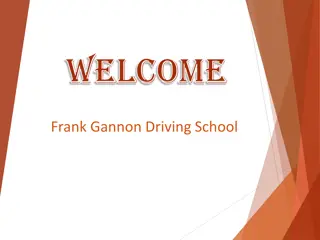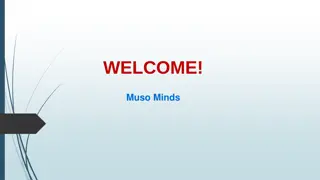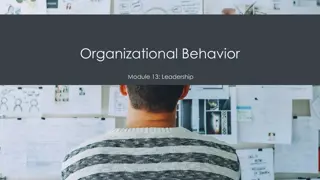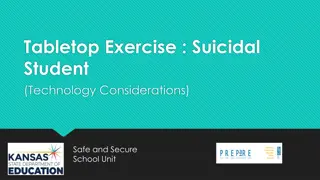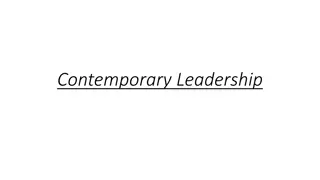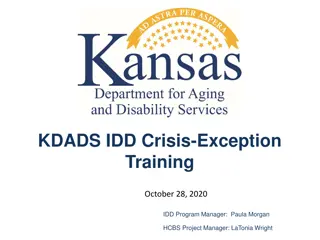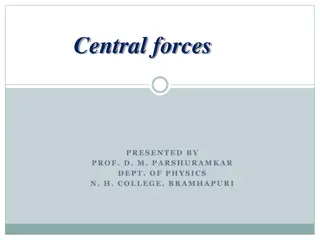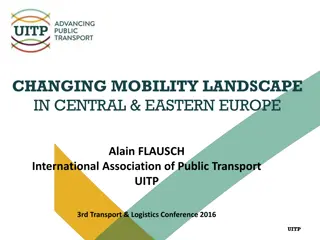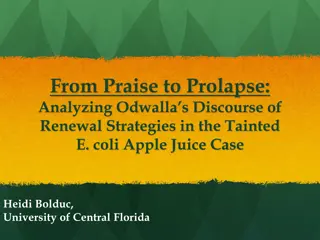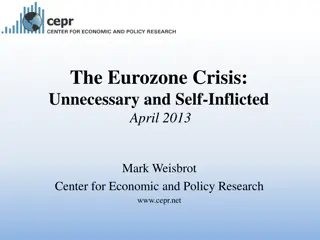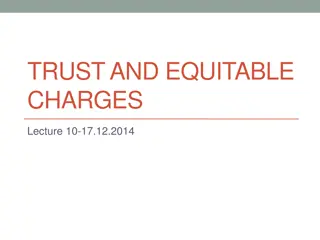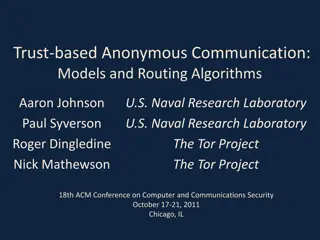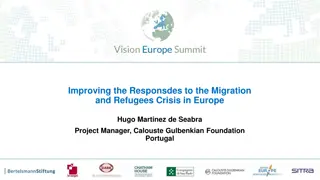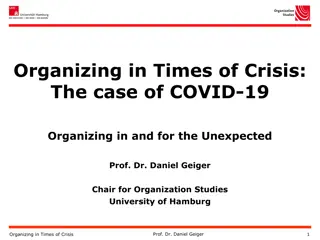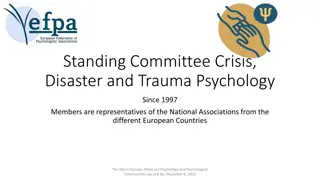Leadership, Trust, and Crisis: Lessons from Central Europe Project
The project funded by multiple governments in Central Europe aims to advance sustainable regional cooperation. The initiative focuses on understanding leadership as a process involving trust, especially in crisis situations. The lesson structure includes case studies, discussions on resources, and exploring the role of trust in leadership. Key questions raised include strategies to build trust and the relationship between leadership and trust. Insights from the Mann Gulch case study highlight the importance of communication and decision-making in earning trust. The triadic nature of leadership, cognitive and affective aspects of trust are also discussed.
Download Presentation

Please find below an Image/Link to download the presentation.
The content on the website is provided AS IS for your information and personal use only. It may not be sold, licensed, or shared on other websites without obtaining consent from the author. Download presentation by click this link. If you encounter any issues during the download, it is possible that the publisher has removed the file from their server.
E N D
Presentation Transcript
T H E P R O J E C T I S C O - F I N A N C E D B Y T H E G O V E R N M E N T S O F C Z E C H I A , H U N G A R Y, P O L A N D A N D S L O V A K I A T H R O U G H V I S E G R A D G R A N T S F R O M I N T E R N AT I O N A L V I S E G R A D F U N D. T H E M I S S I O N O F T H E F U N D I S T O A D V A N C E I D E A S F O R S U S TA I N A B L E R E G I O N A L C O O P E R AT I O N I N C E N T R A L E U R O P E . Trust and Leadership in Crisis and Beyond
Learning Outcomes Understand leadership as a process, a relationship between leaders, followers and context. Integrate the concept of trust within the leadership process- its components and outcomes. Apply the consequences of interpersonal and social trust within the crisis leadership during the COVID-19 pandemic. Describe the how to build interpersonal and social/institutional trust. Construct ways to build social and interpersonal trust in our own lives and communities.
Structure of the lesson Read the case study 1. Respond to the challenge questions individually (or as a group) 2. Discuss resources that provide insights about the case 3. Learn about leadership and the role of trust 4. Discuss interpersonal and social trust in this country during the pandemic 5. Apply the lessons of trust to our own lives and challenges 6.
Mann Gulch Case Study Challenge Questions Why do you think the firefighters responded to Dodge the way they did? 1. Before and during the crisis, what are some things Dodge could have done to get the other fire fighters to trust his approach to the dangerous situation? 2. What is good leadership and what is its relationship to trust? 3.
Insights about Mann Gulch [This] tragic story illustrates vividly that a leader s style of communication and approach to making decisions shapes the extent to which he garners the trust and respect of his subordinates. Despite respect for a leader s expertise and position of authority, individuals will not put their full and complete trust in someone who has not been open with them, built a relationship with them, and given them some input on past decisions. They also will not put their faith in someone who has not explained his rationale for past choices or illustrated how he approaches and solves tough problems. (Michael Roberto, Why Great Leaders Don t Take Yes for an Answer, pg. 219)
The triadic nature of leadership Leader(s) Followers Context
Cognitive Affective Two aspects of interpersonal trust
Why is trust important? We gain more information, helps us solve problems 1. Trust begets belonging 2. It makes our lives more efficient 3. Oxytocin released in the brain 4. It helps others 5.
Populism breeds distrust At the end of 2020, the United States and Brazil had two of the highest number of COVID- 19 cases globally, as well as COVID-19-related deaths. These numbers stood in stark contrast to those reported in other countries where expert advice had been followed. And this juxtaposition, we submit, evidenced to the people who had originally trusted Trump and Bolsonaro that, contrary to their message of self-trust, the people do not always know best . In a complex matter like COVID-19, common sense is not preferable to expert knowledge and analysis. The people are not competent to make decisions regarding COVID-19, including how to minimize the virus s spread; they are in a zone of incompetence . Vitale, D. & Girard, R. (2022) Public trust and the populist leader: A theoretical argument. Global Constitutionalism. Cambridge University Press.
Populism breeds distrust Pew Research Center, 2020 data
COVID-19 in the Czech Republic During the first wave, there was a wartime appeal to solidarity and social responsibility, the acceptance of which helped ensure a surprisingly minor caseload. This message was particularly strong around masking. Masking, as well as adhering to lockdown measures, were expressed in terms of group identity and group effort against a common enemy. The lack of victory after the combined individual as well as group sacrifice helped swing the pendulum from the Czech Republic being negligibly affected during the first wave to consistently being among the worst affected in subsequent waves.
COVID-19 in the Czech Republic Individual statements of information were disseminated broadly and clearly during the pandemic. The problem emerges when the various bits of information are engaged with across time and across waves. Clear statements about what is going on beyond the immediate day of reference are noticeably inconsistent. Within the time period of a few days, the government could reverse its declared policy position. Businesses and schools were allowed to reopen only to be limited or closed in short order. For safety, masks had to be worn in public transport except for the drivers, who one would expect would be at greatest risk of infection and vectoring. The information was disseminated across multiple media, as well as posted by businesses and other effected establishments. This did not translate to the information being easily understood.
COVID-19 in the Czech Republic These mixed messages led to the pandemic response presenting a challenge to popular conceptualizations of science. Popularly conceived, science is a static statement of truth. In actuality, science is a dynamic process of searching for truth. As the pandemic progressed, statements by decision makers supported by science became less and less convincing. To the popular ear, science kept changing its mind. This gave far greater breathing space to anti- science and anti-leadership positions, muddying the waters of credibility. This situation would be bad enough if it were not exacerbated by the consequences of the health/economy debate within the government. Once it became evident that the worth of the individual lives of the population had ben reassessed, trust in the leadership and their claims to support were irreparably damaged.
Social (institutional) trust Social trust is defined as, an individual s expectation that other people and groups can be relied on [It] is one of the most important synthetic forces within society. Not only is social trust an elixir for social functioning, but as part of a nation s social capital, trust affects vital economic variables such as GDP growth and inflation rates. Brandt, M.J., Wetherell, G. & Henry, P.J. (2015) Changes in Income Predict Change in Social Trust: A Longitudinal Analysis. Political Psychology, 36 (6).
Building interpersonal trust 1. Enact solidarity: show care and concern for others and their interests. 2. Take responsibility instead of blaming situation or others 3. Give help or assistance 4. Invite and accept changes to your decisions 5. Seek the advice of others 6. Give responsibility to others, depend on them 7. Be open and direct about task problems and motives 8. Disclose information in an accurate and timely way
What about you? There are many situations that you are in right now that you could be a leader and follower: among your friends, in the classroom, at your university, in the community. You may or may not have a formal position. If you see a change that is needed, will you take the initiative? If you do, then you will need to build trust with your collaborators. What have you learned from this lesson about it? Take the above lists on how to build social and interpersonal trust and apply them to one specific situation in your life: How could you take steps to be more trusting? 1. How could you build trust with those with whom you work and study? 2.


